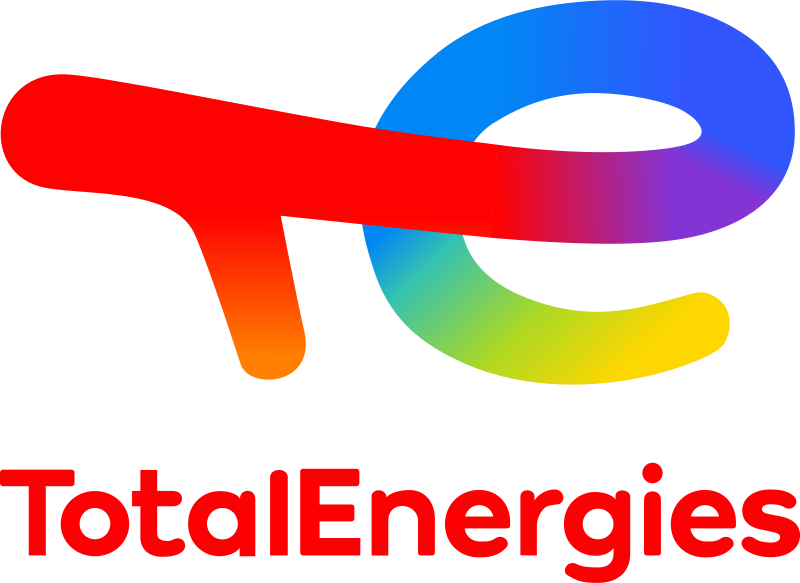Global Smart Grid Analytics Market, By Component, By Application, By Communication Technology, By Region & Segmental Insights Trends and Forecast, 2024 – 2034
- Industry: Energy & Power
- Report ID: TNR-110-1177
- Number of Pages: 420
- Table/Charts : Yes
- June, 2024
- Base Year : 2024
- No. of Companies : 10+
- No. of Countries : 29
- Views : 10126
- Covid Impact Covered: Yes
- War Impact Covered: Yes
- Formats : PDF, Excel, PPT
Smart grid analytics refers to the application of advanced data analytics techniques and technologies to enhance the management, efficiency, and reliability of modern electrical grids. Unlike traditional grids, smart grids integrate digital communication and control capabilities with physical infrastructure, enabling utilities to monitor and optimize grid operations in real-time. Smart grid analytics leverage data from various sources including smart meters, sensors, and grid devices to provide insights into energy consumption patterns, asset performance, and grid stability.
By employing techniques such as machine learning, artificial intelligence, and predictive analytics, utilities can forecast energy demand, detect anomalies, and implement proactive measures to improve grid reliability and responsiveness. This data-driven approach not only enhances operational efficiency and reduces costs but also supports sustainability initiatives by promoting renewable energy integration and reducing environmental impact. Smart grid analytics play a crucial role in modernizing energy infrastructure, ensuring resilient and efficient electricity distribution systems for the future.
A primary demand driver for smart grid analytics is the increasing complexity and dynamic nature of modern energy grids. As utilities worldwide face challenges such as integrating renewable energy sources, managing grid stability, and meeting regulatory requirements, smart grid analytics emerges as a crucial solution. These analytics enable utilities to leverage data from smart meters, sensors, and other IoT devices to monitor grid performance in real-time, predict demand patterns, and optimize energy distribution. By employing advanced analytics techniques like machine learning and predictive modelling, utilities can proactively identify potential issues, prevent outages, and improve overall reliability.
Moreover, the rising emphasis on sustainability and energy efficiency drives the adoption of smart grid analytics, as utilities seek to reduce carbon footprints and meet environmental goals. Regulatory mandates promoting grid modernization and investment in infrastructure also fuel the demand for analytics solutions that enhance grid resilience and operational efficiency. Overall, smart grid analytics play a pivotal role in transforming energy management practices, ensuring reliable and sustainable electricity supply for communities and industries alike. In terms of revenue, the global smart grid analytics market was worth US$ 72.5 Bn in 2023, anticipated to witness CAGR of 21.2% during 2024 – 2034.

Trends in the Global Smart Grid Analytics Market
- Integration of AI and Machine Learning: Increasing adoption of artificial intelligence (AI) and machine learning (ML) algorithms to enhance predictive analytics capabilities. These technologies analyse historical and real-time data to forecast energy demand, optimize grid operations, and improve decision-making processes.
- Expansion of IoT in Energy Infrastructure: Growing deployment of Internet of Things (IoT) devices such as smart meters and sensors to collect real-time data on energy consumption, grid performance, and environmental conditions. IoT integration enables utilities to monitor and manage assets more efficiently, enhancing grid reliability and customer service.
- Focus on Grid Security and Resilience: Heightened emphasis on cybersecurity measures to protect smart grid infrastructure from cyber threats and ensure data privacy. Utilities are implementing advanced security solutions and protocols to safeguard critical assets and infrastructure.
- Demand Response and Customer Engagement: Increasing adoption of demand response programs leveraging smart grid analytics to manage peak demand, reduce energy consumption during high-cost periods, and engage customers in energy conservation efforts.
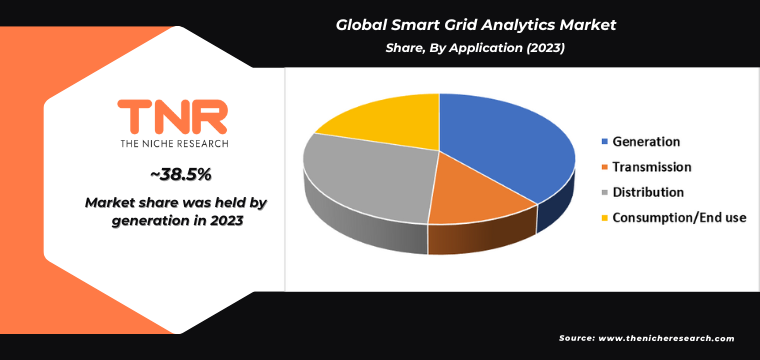
By Component Software Segment had the Highest Share in the Global Smart Grid Analytics Market in 2023.
Software solutions play a crucial role as a demand driver in the field of smart grid analytics, facilitating the integration, management, and analysis of vast amounts of data generated by modern energy grids. Advanced software platforms enable utilities to harness data from various sources including smart meters, sensors, and grid devices to gain actionable insights for optimizing grid operations and enhancing energy efficiency. These software solutions employ sophisticated analytics algorithms such as machine learning and artificial intelligence to forecast energy demand, detect anomalies, and optimize asset performance in real-time.
Moreover, the scalability and customization offered by software platforms allow utilities to adapt quickly to evolving grid requirements and regulatory changes. The demand for smart grid analytics software is further propelled by the increasing complexity of energy systems, growing adoption of renewable energy sources, and the need for grid modernization initiatives worldwide. As utilities seek to improve grid reliability, reduce operational costs, and meet sustainability goals, robust software solutions continue to drive innovation and efficiency in smart grid management.
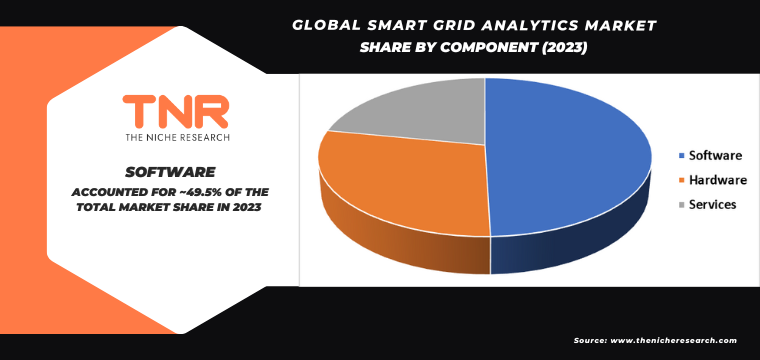
By Communication Technology Wireless segment is Projected as the Fastest Growing Segment in the Global Smart Grid Analytics Market During the Forecasted Period.
Wireless technology serves as a critical demand driver in the realm of smart grid analytics, primarily due to its ability to enhance the efficiency, reliability, and scalability of modern energy infrastructures. One of the key drivers is the flexibility wireless networks offer, enabling utilities to deploy smart grid solutions rapidly and cost-effectively across diverse geographical areas. Wireless communication supports seamless integration of numerous IoT devices, such as smart meters and sensors, facilitating real-time data collection and analysis. This capability is crucial for utilities aiming to optimize grid operations, manage energy demand, and improve overall system resilience.
Additionally, the evolution of wireless standards like 5G and LPWAN (Low Power Wide Area Network) enhances data transmission speeds and reliability, further bolstering the adoption of wireless solutions in smart grid analytics. Moreover, wireless technologies enable utilities to implement demand response programs effectively, empowering consumers to adjust their electricity usage based on real-time pricing signals or grid conditions. As the demand for efficient energy management solutions grows, wireless smart grid analytics continue to play a pivotal role in driving innovation and sustainability in the energy sector.
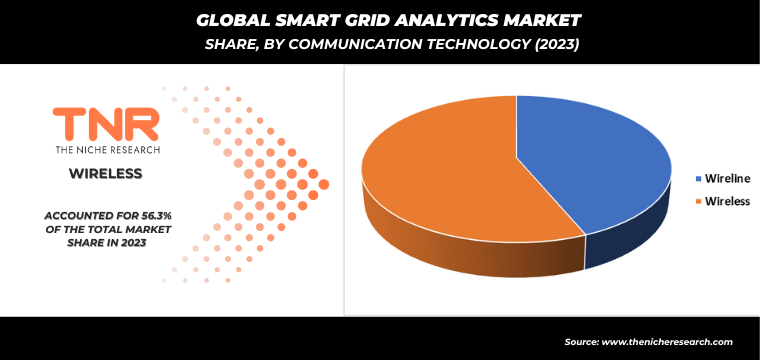
North America by Region Dominated the Global Smart Grid Analytics Market in 2023.
In North America, the demand for smart grid analytics is driven by several key factors that underscore its critical role in modernizing energy infrastructure. The increasing integration of renewable energy sources like solar and wind necessitates advanced analytics to optimize grid stability and manage intermittent power generation effectively. Smart grid analytics also supports demand response programs, enabling utilities to balance supply and demand dynamically and improve grid reliability. Moreover, the aging infrastructure and the need for grid modernization initiatives further stimulate the adoption of analytics tools to enhance operational efficiency, reduce maintenance costs, and prevent system failures.
Regulatory mandates promoting energy efficiency and sustainability drive utilities to deploy analytics for real-time monitoring and predictive maintenance of grid assets. Additionally, the rise of electric vehicles (EVs) and smart home technologies increases electricity demand variability, compelling utilities to leverage analytics for load forecasting and grid management. These factors collectively drive the demand for smart grid analytics, positioning North America as a key market for technological advancements in energy management and sustainability.
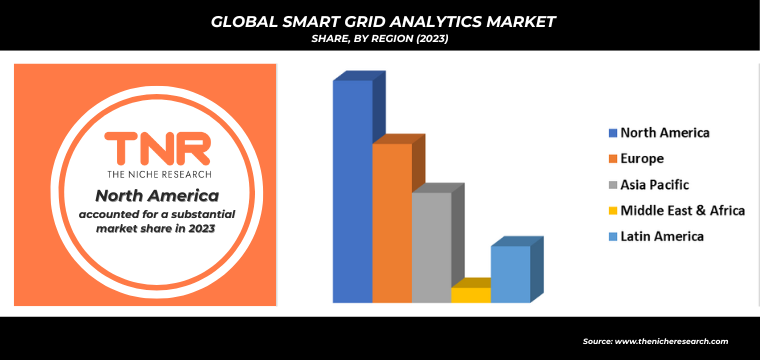
Competitive Landscape
Some of the players operating in the smart grid analytics market are
- ABB Ltd
- Cisco Systems Inc
- General Electric Company
- IBM Corporations
- Itron Inc
- Open Systems International Inc
- Oracle Corporations
- Schneider Electric SA
- Siemens AG
- Wipro Ltd
- Other Industry Player
Global Smart Grid Analytics Market Scope
| Report Specifications | Details |
| Market Revenue in 2023 | US$ 72.5 Bn |
| Market Size Forecast by 2034 | US$ 601.1 Bn |
| Growth Rate (CAGR) | 21.2% |
| Historic Data | 2016 – 2022 |
| Base Year for Estimation | 2023 |
| Forecast Period | 2024 – 2034 |
| Report Inclusions | Market Size & Estimates, Market Dynamics, Competitive Scenario, Trends, Growth Factors, Market Determinants, Key Investment Segmentation, Product/Service/Solutions Benchmarking |
| Segments Covered | By Component, By Application, By Communication Technology, By Region |
| Regions Covered | North America, Europe, Asia Pacific, Middle East & Africa, Latin America |
| Countries Covered | U.S., Canada, Mexico, Rest of North America, France, The UK, Spain, Germany, Italy, Nordic Countries (Denmark, Finland, Iceland, Sweden, Norway), Benelux Union (Belgium, The Netherlands, Luxembourg), Rest of Europe, China, Japan, India, New Zealand, Australia, South Korea, Southeast Asia (Indonesia, Thailand, Malaysia, Singapore, Rest of Southeast Asia), Rest of Asia Pacific, Saudi Arabia, UAE, Egypt, Kuwait, South Africa, Rest of Middle East & Africa, Brazil, Argentina, Rest of Latin America |
| Key Players | ABB Ltd, Cisco Systems Inc, General Electric Company, IBM Corporations, Itron Inc, Open Systems International Inc, Oracle Corporations, Schneider Electric SA, Siemens AG, Wipro Ltd |
| Customization Scope | Customization allows for the inclusion/modification of content pertaining to geographical regions, countries, and specific market segments. |
| Pricing & Procurement Options | Explore purchase options tailored to your specific research requirements |
| Contact Details | Consult With Our Expert
Japan (Toll-Free): +81 663-386-8111 South Korea (Toll-Free): +82-808- 703-126 Saudi Arabia (Toll-Free): +966 800-850-1643 United Kingdom: +44 753-710-5080 United States: +1 302-232-5106 E-mail: askanexpert@thenicheresearch.com
|
Global Smart Grid Analytics Market
By Component
- Software
- Hardware
- Services
By Application
- Generation
- Transmission
- Distribution
- Consumption/End use
By Communication Technology
- Wireline
- Wireless
By Region
- North America (U.S., Canada, Mexico, Rest of North America)
- Europe (France, The UK, Spain, Germany, Italy, Nordic Countries (Denmark, Finland, Iceland, Sweden, Norway), Benelux Union (Belgium, The Netherlands, Luxembourg), Rest of Europe)
- Asia Pacific (China, Japan, India, New Zealand, Australia, South Korea, Southeast Asia (Indonesia, Thailand, Malaysia, Singapore, Rest of Southeast Asia), Rest of Asia Pacific)
- Middle East & Africa (Saudi Arabia, UAE, Egypt, Kuwait, South Africa, Rest of Middle East & Africa)
- Latin America (Brazil, Argentina, Rest of Latin America)
Report Layout:
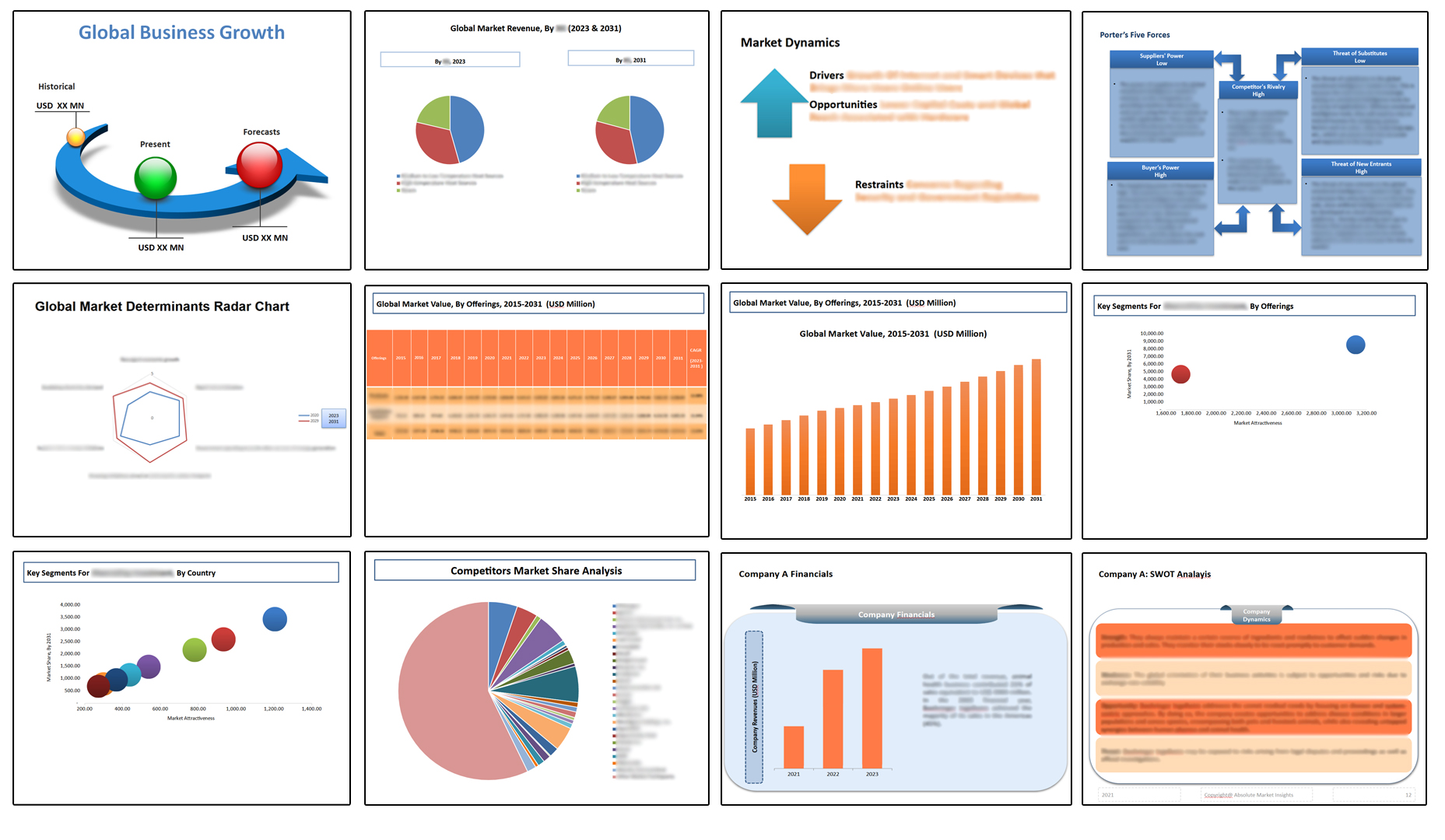
Table of Contents
Note: This ToC is tentative and can be changed according to the research study conducted during the course of report completion.
**Exclusive for Multi-User and Enterprise User.
Global Smart Grid Analytics Market
By Component
- Software
- Hardware
- Services
By Application
- Generation
- Transmission
- Distribution
- Consumption/End use
By Communication Technology
- Wireline
- Wireless
By Region
- North America (U.S., Canada, Mexico, Rest of North America)
- Europe (France, The UK, Spain, Germany, Italy, Nordic Countries (Denmark, Finland, Iceland, Sweden, Norway), Benelux Union (Belgium, The Netherlands, Luxembourg), Rest of Europe)
- Asia Pacific (China, Japan, India, New Zealand, Australia, South Korea, Southeast Asia (Indonesia, Thailand, Malaysia, Singapore, Rest of Southeast Asia), Rest of Asia Pacific)
- Middle East & Africa (Saudi Arabia, UAE, Egypt, Kuwait, South Africa, Rest of Middle East & Africa)
- Latin America (Brazil, Argentina, Rest of Latin America)
The Niche Research approach encompasses both primary and secondary research methods to provide comprehensive insights. While primary research is the cornerstone of our studies, we also incorporate secondary research sources such as company annual reports, premium industry databases, press releases, industry journals, and white papers.
Within our primary research, we actively engage with various industry stakeholders, conducting paid interviews and surveys. Our meticulous analysis extends to every market participant in major countries, allowing us to thoroughly examine their portfolios, calculate market shares, and segment revenues.
Our data collection primarily focuses on individual countries within our research scope, enabling us to estimate regional market sizes. Typically, we employ a bottom-up approach, meticulously tracking trends in different countries. We analyze growth drivers, constraints, technological innovations, and opportunities for each country, ultimately arriving at regional figures.Our process begins by examining the growth prospects of each country. Building upon these insights, we project growth and trends for the entire region. Finally, we utilize our proprietary model to refine estimations and forecasts.
Our data validation standards are integral to ensuring the reliability and accuracy of our research findings. Here’s a breakdown of our data validation processes and the stakeholders we engage with during our primary research:
- Supply Side Analysis: We initiate a supply side analysis by directly contacting market participants, through telephonic interviews and questionnaires containing both open-ended and close-ended questions. We gather information on their portfolios, segment revenues, developments, and growth strategies.
- Demand Side Analysis: To gain insights into adoption trends and consumer preferences, we reach out to target customers and users (non-vendors). This information forms a vital part of the qualitative analysis section of our reports, covering market dynamics, adoption trends, consumer behavior, spending patterns, and other related aspects.
- Consultant Insights: We tap into the expertise of our partner consultants from around the world to obtain their unique viewpoints and perspectives. Their insights contribute to a well-rounded understanding of the markets under investigation.
- In-House Validation: To ensure data accuracy and reliability, we conduct cross-validation of data points and information through our in-house team of consultants and utilize advanced data modeling tools for thorough verification.
The forecasts we provide are based on a comprehensive assessment of various factors, including:
- Market Trends and Past Performance (Last Five Years): We accurately analyze market trends and performance data from preceding five years to identify historical patterns and understand the market’s evolution.
- Historical Performance and Growth of Market Participants: We assess the historical performance and growth trajectories of key market participants. This analysis provides insights into the competitive landscape and individual company strategies.
- Market Determinants Impact Analysis (Next Eight Years): We conduct a rigorous analysis of the factors that are projected to influence the market over the next eight years. This includes assessing both internal and external determinants that can shape market dynamics.
- Drivers and Challenges for the Forecast Period:Identify the factors expected to drive market growth during the forecast period, as well as the challenges that the industry may face. This analysis aids in deriving an accurate growth rate projection.
- New Acquisitions, Collaborations, or Partnerships: We keep a close watch on any new acquisitions, collaborations, or partnerships within the industry. These developments can have a significant impact on market dynamics and competitiveness.
- Macro and Micro Factors Analysis:A thorough examination of both macro-level factors (e.g., economic trends, regulatory changes) and micro-level factors (e.g., technological advancements, consumer preferences) that may influence the market during the forecast period.
- End-User Sentiment Analysis: To understand the market from the end-user perspective, we conduct sentiment analysis. This involves assessing the sentiment, preferences, and feedback of the end-users, which can provide valuable insights into market trends.
- Perspective of Primary Participants: Insights gathered directly from primary research participants play a crucial role in shaping our forecasts. Their perspectives and experiences provide valuable qualitative data.
- Year-on-Year Growth Trend: We utilize a year-on-year growth trend based on historical market growth and expected future trends. This helps in formulating our growth projections, aligning them with the market’s historical performance.
Research process adopted by TNR involves multiple stages, including data collection, validation, quality checks, and presentation. It’s crucial that the data and information we provide add value to your existing market understanding and expertise. We have also established partnerships with business consulting, research, and survey organizations across regions and globally to collaborate on regional analysis and data validation, ensuring the highest level of accuracy and reliability in our reports.









